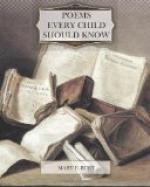Barbara Frietchie’s
work is o’er,
And the rebel rides on his
raids no more.
Honour to her! and let a tear
Fall, for her sake, on Stonewall’s
bier.
Over Barbara Frietchie’s
grave,
Flag of Freedom and Union,
wave!
Peace and order and beauty
draw
Round thy symbol of light
and law;
And ever the stars above look
down
On thy stars below in Frederick
town!
JOHN G. WHITTIER.
PART III.
The Day’s at the Morn
LOCHINVAR.
“Lochinvar” and “Lord Ullin’s Daughter,” the first by Scott (1771-1832) and the second by Campbell (1777-1844), are companions in sentiment and equally popular with boys who love to win anything desirable by heroic effort.
Oh, young Lochinvar is come
out of the west.
Through all the wide Border
his steed was the best,
And save his good broadsword
he weapons had none;
He rode all unarmed, and he
rode all alone.
So faithful in love, and so
dauntless in war,
There never was knight like
the young Lochinvar.
He stayed not for brake, and
he stopped not for stone,
He swam the Eske River where
ford there was none;
But ere he alighted at Netherby
gate
The bride had consented, the
gallant came late:
For a laggard in love, and
a dastard in war
Was to wed the fair Ellen
of brave Lochinvar.
So boldly he entered the Netherby
Hall,
Among bridesmen and kinsmen
and brothers and all:
Then spoke the bride’s
father, his hand on his sword
(For the poor craven bridegroom
said never a word),
“Oh, come ye in peace here,
or come ye in war,
Or to dance at our bridal,
young Lord Lochinvar?”
“I long woo’d your daughter,
my suit you denied;—
Love swells like the Solway,
but ebbs like its tide—
And now am I come, with this
lost love of mine,
To lead but one measure, drink
one cup of wine.
There are maidens in Scotland
more lovely by far,
That would gladly be bride
to the young Lochinvar.”
The bride kissed the goblet;
the knight took it up;
He quaffed of the wine, and
he threw down the cup.
She looked down to blush,
and she looked up to sigh,
With a smile on her lips and
a tear in her eye.
He took her soft hand ere
her mother could bar,—
“Now tread we a measure!”
said young Lochinvar.
So stately his form, and so
lovely her face,
That never a hall such a galliard
did grace;
While her mother did fret,
and her father did fume,
And the bridegroom stood dangling
his bonnet and plume,
And the bridemaidens whispered,
“’Twere better by far
To have matched our fair cousin
with young Lochinvar.”




